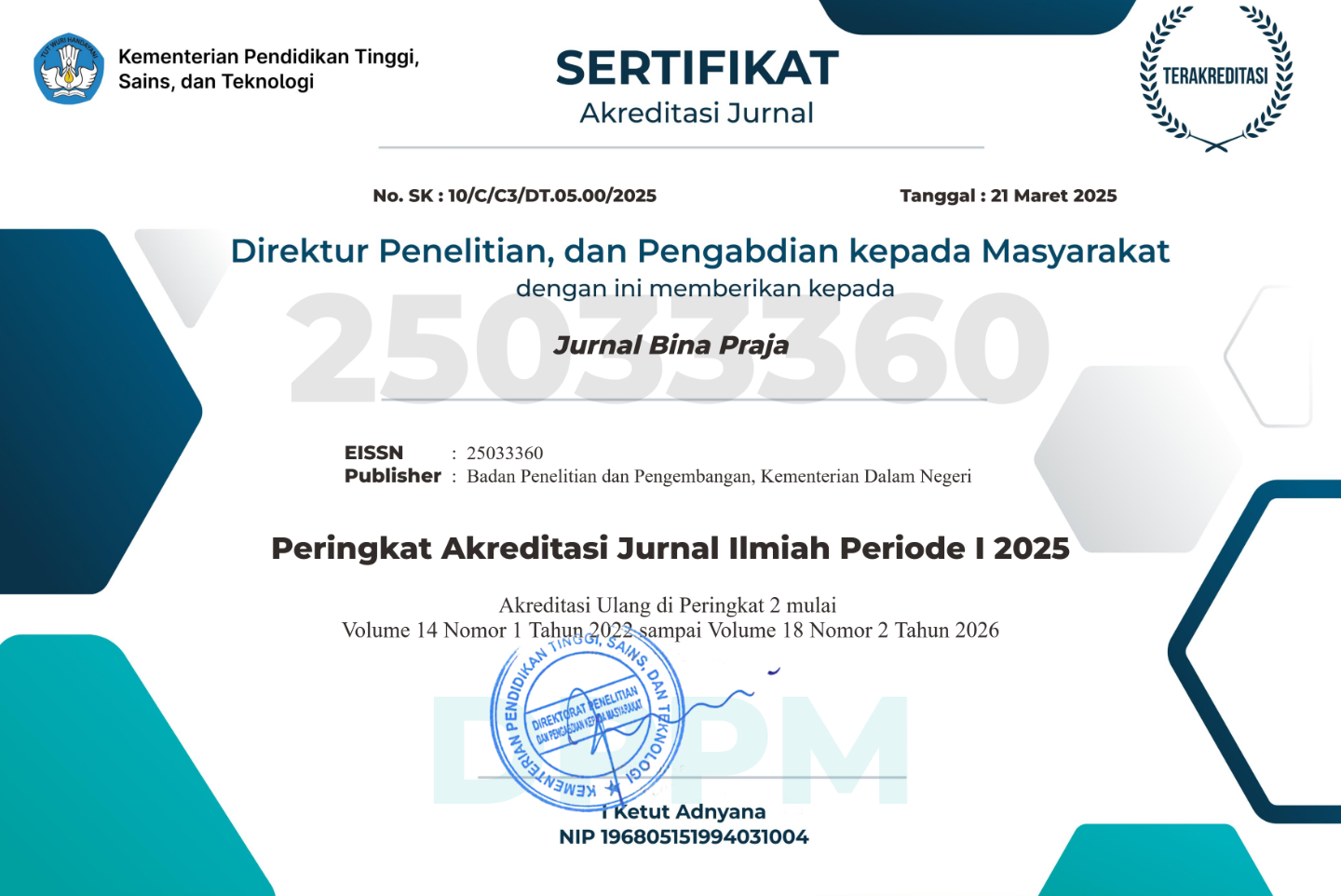Defining Inclusiveness in Development
Perspective from Local Government’s Apparatus
DOI:
https://doi.org/10.21787/jbp.11.2019.137-147Keywords:
Inclusive development, government apparatus perception, development planning document analysisAbstract
This article discusses how inclusive development is translated into policy and regional development planning. Perspectives used are that of the regional government apparatus in-charge of development planning. As a strategic actor in decision making, those in charge of development planning hold an important role in determining what counts as inclusive development, who the targets are, and how such inclusivity could be realized through development programs. The research was conducted in Bandung Regency, one of the regions that experience rapid economic growth, as well as one that is facing the challenges of poverty and the decline of environmental support capacity. The method that was used in this research is the quantitative method to discover the perceptions of government apparatus, which afterwards are confirmed through textual analysis of regional development planning documents. From this initial research, development planning process is suspected to not have optimal public participation, as well as to not have involved marginalized groups, so that policies and programs are less able to accommodate several strategic regional issues. Therefore, there is a need to create a comprehensive effort towards achieving an inclusive development agenda as the primary goal in Bandung Regency development.
Downloads
References
Burton, M., & Higley, J. (2001). The Study of Political Elite Transformations. International Review of Sociology, 11(2), 181–199. https://doi.org/10.1080/713674040
Chatterjee, P. (2004). The Politics of the Governed: Reflections on Popular Politics in Most of the World. New York: Columbia University Press.
Gupta, J., Pouw, N. R. M., & Ros-Tonen, M. A. F. (2015). Towards an Elaborated Theory of Inclusive Development. The European Journal of Development Research, 27(4), 541–559. https://doi.org/10.1057/ejdr.2015.30
Gupta, J., & Vegelin, C. (2016). Sustainable development goals and inclusive development. International Environmental Agreements: Politics, Law and Economics, 16(3), 433–448. https://doi.org/10.1007/s10784-016-9323-z
Hickey, S. (2015). Thinking About the Politics of Inclusive Development: Towards a Relational Approach. SSRN Electronic Journal, (1), 1–34. https://doi.org/10.2139/ssrn.2425235
Hossain, N., & Moore, M. (2002). Arguing for the Poor: Elites and Poverty in Developing Countries (No. 148). Retrieved from https://www.ids.ac.uk/publications/arguing-for-the-poor-elites-and-poverty-in-developing-countries/
Krippendorff, K. (1991). Content Analysis: An Introduction to Its Methodology. Sage Publications.
Leftwich, A. (1995). Bringing politics back in: Towards a model of the developmental state. Journal of Development Studies, 31(3), 400–427. https://doi.org/10.1080/00220389508422370
Nelson, J. (2003). Grounds for Alliance?: OVERLAPPING INTERESTS OF POOR AND NOT SO POOR. In P. Houtzager & M. Moore (Eds.), Changing Paths: International Development and the New Politics of Inclusion (pp. 119–138). Retrieved from http://www.jstor.org/stable/10.3998/mpub.17792.9
OECD. (2016). The Governance of Inclusive Growth. https://doi.org/10.1787/9789264257993-en
Oxfam. (2018). Oxfam Annual Report 2017 - 2018.
Post, L. A., Raile, A. N. W., & Raile, E. D. (2010). Defining political will. Politics and Policy, 38(4), 653–676. https://doi.org/10.1111/j.1747-1346.2010.00253.x
Rauniyar, G., & Kanbur, R. (2010). Inclusive growth and inclusive development: a review and synthesis of Asian Development Bank literature. Journal of the Asia Pacific Economy, 15(4), 455–469. https://doi.org/10.1080/13547860.2010.517680
Shankar Aiyar, M. (2015). Inclusive Governance for Inclusive Development. In J. P. Faguet & C. Pöschl (Eds.), Is Decentralization Good For Development? (pp. 80–108). https://doi.org/10.1093/acprof:oso/9780198737506.003.0004
van Gent, S. (2017). Beyond buzzwords: What is “inclusive development� Leiden.
Vu, T. (2007). State formation and the origins of developmental states in south korea and indonesia. Studies in Comparative International Development, 41(4), 27–56. https://doi.org/10.1007/BF02800470
















